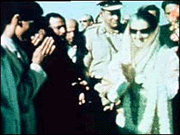 |
| The judge rejected charges of bribery |
| 1975: Indira Gandhi found guilty of corruption |
England have
Indian Prime Minister Indira Gandhi has been barred from holding office for six years after she was found guilty of electoral corruption.
But Mrs Gandhi rejected calls to resign and announced plans to appeal to the Supreme Court.
The verdict was delivered by Mr Justice Sinha at Allahabad High Court. It came almost four years after the case was brought by Raj Narain, the premier's defeated opponent in the 1971 parliamentary election.
Mrs Gandhi, who gave evidence in her defence during the trial, was found guilty of dishonest election practices, excessive election expenditure, and of using government machinery and officials for party purposes.
The judge rejected more serious charges of bribery against her.
"The leadership of Mrs Gandhi is indispensable ."said in a Party statement.
Mrs Gandhi insisted the conviction did not undermine her position, despite having beenunseatedfrom the lower house of parliament, Lok Sabha, by order of the High Court.
She said: "There is a lot of talk about our government not being clean, but from our experience the situation was very much worse when [opposition] parties were forming governments".
And she dismissed criticism of the way her Congress Party raised election campaign money, saying all parties used the same methods.
The prime minister has retained the support of her party, which issued a statement backing her.
"The leadership of Mrs Gandhi is indispensable," the statement read.
After news of the verdict spread, hundreds of supporters demonstrated outside her house, pledging their loyalty.
Indian High Commissioner BK Nehru said Mrs Gandhi's conviction would not harm her political career.
"Mrs Gandhi has still today overwhelming support in the country," he said.
"I believe the prime minister of India will continue in office until the electorate of India decides otherwise".
|